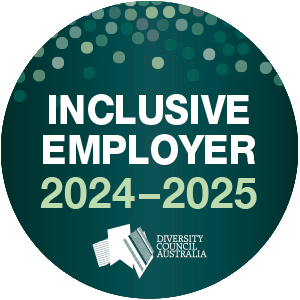I moved to Alice Springs in September 2014 to take on the role of Program Manager of the first Men’s Behaviour Change Program in the Northern Territory that was informed by the No to Violence standards of practice. The Men’s Behaviour Change consortium was compiled of Jesuit Social Services and the Women’s Safety Services of Central Australia (WoSSCA) who implement our partner safety work.
Tangentyere Council is an Aboriginal community-controlled organisation and I think it is important to mention that the MBC has been and continues to be endorsed and supported by the 16 Town Camp Aboriginal executives of the Tangentyere Board. I think it was an enormous leap of faith to begin the program and I still feel to this day that there is a huge commitment to address family, domestic and sexual violence in Alice Springs but particularly in the Town Camps. I often wonder at the leap of faith to employ a white woman from Melbourne to head up the Men’s Behaviour Change Program and feel extremely privileged in the trust that I received particularly in the early days of the program.
The early days of the program were interesting and I had so much to learn, I worked with three fantastic Aboriginal male consultants who were all well-known men in the Town Camps who carried a great deal of cultural authority and each taught me different things. My most important lesson occurred not long after I began and one of our consultants took me aside for a chat. He said to me, ‘you need to talk more straight about violence’ ‘you are slipping and sliding and not talking straight’. I knew what he was meaning: I was alluding to violence and not speaking straight up about the impacts of violence or in fact what violence really is. As a result, our program became “Marraka Mbariintja” which means in Arrente “talking straight to make change”, it is this philosophy that has guided our program ever since and is reflected in our Minimum Standards.
I have always felt extremely supported by Aboriginal male leaders in Alice Springs, in the beginning, I had a number of these leaders come in a chat with me, no doubt sizing me up to see what my thoughts were. I have always enjoyed Men’s Behaviour Change and believe that relationships (without collusion) are pivotal to men’s change process which I hope they understood early on. I was also very clear with both men and women that our program was not about breaking up relationships or families but to support men and women to help their families to be stronger, healthier, and happier. Unfortunately, the cohort of men that struggled with my presence and my work was non-indigenous men who were confused about how I was going to work with “traditional Aboriginal men” it appeared to be very confronting to them and while I tried to be patient I didn’t really do a deep dive into what their issues were, I was far more concerned about hearing from Aboriginal men and women.
I love the groups and have always loved my work here but worried in the early days that I could not speak well enough to the experiences of Aboriginal women who experienced violence. As a result, I started working closely with the Tangentyere Women’s Safety Group (TWFSG). The TWFSG are a group of Aboriginal Town Camp women and absolute powerhouses, together we talked a lot about violence, its impacts, the men they were worried about, the brothers, the sons, and family members who were using violence. The women hold a perpetual hope for change that family violence would be addressed. The women then undertook the governance of the family violence prevention program and since this time, we have developed the Domestic Violence Specialist Program, our primary prevention arm “Mums Can, Dads Can” and a number of culturally safe resources. The Tangentyere women have gone from strength to strength and are very big advocates of non-violence and remain our biggest supporters of the Men’s Behaviour Change Program. One lady describes the program as, ‘the men’s changing behaviour program’ which, quite frankly, makes more sense.
I also work closely with our male leadership team, the Tangentyere Men’s Family Safety Group (TMFSG), which focuses on a range of issues including family, domestic and sexual violence, suicide prevention, at-risk young people, and community safety.
Our standards reflect the learning we’ve all done over the previous six years. Recently, our MBC participants were consulted regarding the standards as we were interested in the men’s thoughts about non-Indigenous facilitators and having both male and female facilitators in the group which elicited some interesting and meaningful conversations.
I believe fundamentally that the trust Tangentyere has in the community has definitely supported our work alongside the important role the TWFSG/TMFSG has in the program has impacted greatly on how far we have come. We have adapted our practice because we have had to. Our context here is different from that of Victoria. But what we have never changed is our commitment to the wellbeing and accountability of men who use violence and the safety of women and children which underpins all of our work.
Our program is ground up and informed by the communities we work in, we all work together, we develop and grow together, and as our Tangentyere strategic plan says ‘Our clients are our bosses, our bosses are our clients’ which is so apt in the context of the Tangentyere Men’s Behaviour Change Program.”
Maree Corbo








